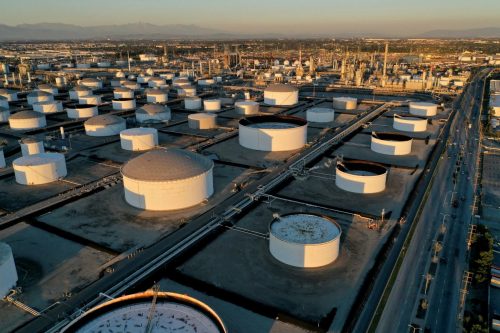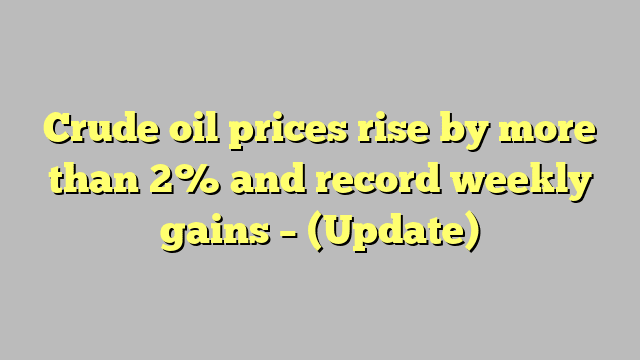Crude oil prices rose by more than 2%, at the end of today’s trading, Friday, February 10 (2023), to achieve weekly gains.
This came with Russia’s announcement of plans to cut oil production next month after the West imposed ceilings on oil prices and petroleum products in the country.
Crude oil prices began their trading today, Friday, with a decline, as the market continued to fluctuate between fears of a recession in the United States and hopes for a strong recovery in fuel demand in China, the largest oil importer in the world.
Crude oil prices today
At the end of trading, the prices of benchmark Brent crude futures – for April delivery 2023 – rose by 2.2%, to reach $86.39 a barrel.
The price of US West Texas crude futures – for March 2023 delivery – rose by 2.1%, to $79.72 a barrel, according to data seen by the specialized energy platform.
And crude oil prices ended their dealings, yesterday, Thursday, February 9, declining for the first time in 4 consecutive sessions, with concerns about demand in America.
Both benchmarks (Brent and West Texas) achieved weekly gains of 8.1% and 8.6%, respectively.
Russian oil production
Russian Deputy Prime Minister Alexander Novak said today, Friday, that his country intends to reduce its crude oil production in March by 500 thousand barrels per day, or about 5% of production.

“The Russian economy is in a state of tension in the face of Western sanctions,” said analyst at BVM Stephen Brennock.
The G7 economies, the European Union and Australia agreed to ban the use of Western-provided marine insurance, financing and brokerage of Russian seaborne oil priced at more than $60 a barrel from December 5 as part of Western sanctions over Russia’s actions in Ukraine.
The European Union has also banned purchases of Russian oil products and set price ceilings from February 5.
By the end of the year, Brenok added, the latest measures will reduce the Kremlin’s profits from fossil fuels and exacerbate its financial problems.
Goldman Sachs cut its 2023 Brent price forecast to $92 a barrel from $98 a barrel and its 2024 price forecast to $100 a barrel from $105 a barrel.
Oil market conditions
The Russian announcement marked a shift in the bearish sentiment that characterized trade on Thursday and Friday morning on the back of recession fears in the US and weak demand data from China.
The decline in crude oil prices came, during yesterday’s trading, Thursday, after a report showed that the number of Americans claiming unemployment benefits rose more than expected last week; Which reignited recession fears.
“The overnight sentiment appears to be bearish after the US unemployment data,” said Baden-Moore, head of commodity research at the National Australia Bank.
“However, I expect the recovery of demand in China to be more important to the price outlook through the second half of 2023,” he added, according to Reuters.

Oil price forecast
An increase in China’s consumer price index for January compared to December, with the inflation target of around 3% set by the government last year approaching, added an air of caution to the oil market.
“The rise in China’s consumer price index in January reflects the consumption demand of the population before the Chinese New Year, but the data is not as good as expected, which reflects the slow recovery phase of the economy,” said Leon Li, an analyst at CMC Markets.
“Therefore, crude oil prices will remain volatile at this point,” he added, according to Reuters.
US oil stocks
The latest US oil inventories data this week raised concerns about a slowdown in the world’s largest economy. Crude stocks jumped to their highest levels since June 2021.
However, the two benchmarks (Brent and West Texas Intermediate) have jumped more than 5% so far this week, reversing most of the previous week’s losses as concerns about the US Federal Reserve raising interest rates faded.
The weekly report of Baker Hughes showed that the number of oil drilling rigs in the United States increased by 10 rigs during the past week, bringing the total to 609 rigs.
Chinese demand
The market was buoyed by Saudi Arabia’s move to increase its official crude sales prices to Asia, which is seen as reflecting the recovery in demand in China; Crude oil flows are expected to increase in March.
“Refiners are likely to boost operating rates from March to meet domestic demand as well as export needs,” said Emma Li, China oil market analyst at Vortexa.
Looking ahead, China’s demand will be one of the most important drivers to watch for oil prices, said Sushant Gupta, director of research at Wood Mackenzie.
He added, “Indications are emerging of a stabilization or decrease in coronavirus cases, which will fuel positive sentiments for crude oil prices.”
related topics..
Also read..

Leave a Reply